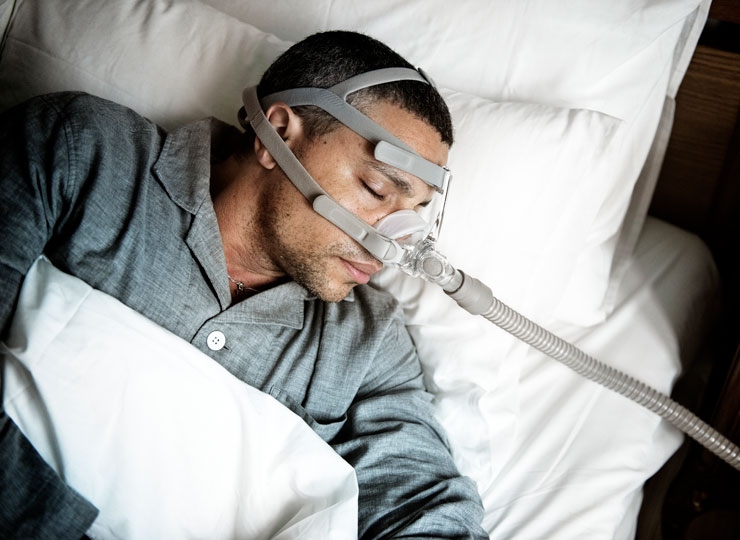
June 7, 2021
Millions of older adults suffer from a breathing disorder called obstructive sleep apnea, in which they unknowingly stop breathing for brief periods throughout the night. Breathing may be interrupted anywhere from five to 30 times an hour, often accompanied by a loud snore. The condition has been linked to memory decline and an increased risk of Alzheimer’s disease. But treating sleep apnea with a special mask that delivers a steady stream of air into the lungs during the night, a treatment called positive airway pressure or PAP, may help to ward off Alzheimer’s and other forms of dementia, according to a new report.
Sleep apnea is very common in older people, especially those who are overweight, though many people don’t even know they have it. It occurs when the soft tissues at the back of the mouth and throat relax too much during sleep, causing the airways to become blocked. People with the condition often snore loudly and can wake up hundreds of times during the night, leading to daytime grogginess and fuzzy thinking, though they typically do not remember waking during the night.
For the study, researchers at the University of Michigan’s Sleep Disorders Centers analyzed medical records of more than 50,000 sleep apnea patients aged 65 and older. Some wore the special PAP masks during the night, while others did not.
“We found a significant association between positive airway pressure use and lower risk of Alzheimer’s and other types of dementia over three years, suggesting that positive airway pressure may be protective against dementia risk in people with sleep apnea,” said the study’s lead author, Galit Levi Dunietz, an assistant professor of neurology and a sleep epidemiologist at Michigan Medicine.
Older adults with sleep apnea who regularly used a PAP device were 35 percent less likely to develop Alzheimer’s disease. They were also less likely to develop mild cognitive impairment, which progresses to full-blown dementia about half the time.
The findings, published in the journal Sleep, suggest that identifying and treating sleep apnea could play a critical role in the cognitive health of older adults. Diagnosing the condition typically requires monitoring the sleeper overnight with a special recording device, either in the patient’s home or at a sleep lab/sleep clinic. Treating sleep apnea requires a PAP machine as well as wearing a mask during sleep, which many people find cumbersome.
But effective treatment of sleep apnea may be critical for the health of both mind and body. In addition to causing daytime sleepiness and fatigue, sleep apnea has been linked to medical conditions like heart disease, high blood pressure and diabetes, all of which are also tied to an increased risk of dementia. Poor sleep and sleep apnea have also been linked to forgetfulness and memory problems in general.
Sleep apnea may cause memory problems for a variety of reasons. One is that constant interruptions of sleep might alter so-called sleep architecture, or the normal stages of sleep. By not allowing the brain to go — or stay long enough — in a deep sleep stage, some of the restorative functions of sleep, including the consolidation of new memories, might become impaired. Another reason could be that apnea is associated with low blood oxygen levels, which would reduce oxygen supply to the brain. Wearing a PAP mask helps to assure that more oxygen gets to the lung, replenishing blood oxygen levels that then go to the brain.
Sleep apnea may be particularly prevalent in people with Alzheimer’s disease, with some estimates as high as 70 percent to 80 percent. Earlier research has shown that elderly patients with Alzheimer’s disease suffered more severe symptoms from sleep apnea, including frequent awakenings, than sleep apnea patients without dementia.
If you suspect that breathing problems during sleep may be contributing to memory and thinking problems, it is important to discuss this with your doctor.
By ALZinfo.org, The Alzheimer’s Information Site. Reviewed by Marc Flajolet, Ph.D., Fisher Center for Alzheimer’s Research Foundation at The Rockefeller University.
Source: Galit L. Duniet, Ronald D. Chervin, James F. Burke, et al: “Obstructive sleep apnea treatment and dementia risk in older adults.” Sleep, March 26, 2021











